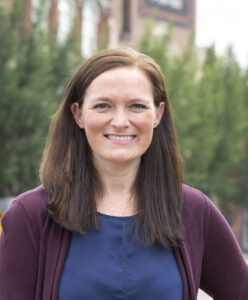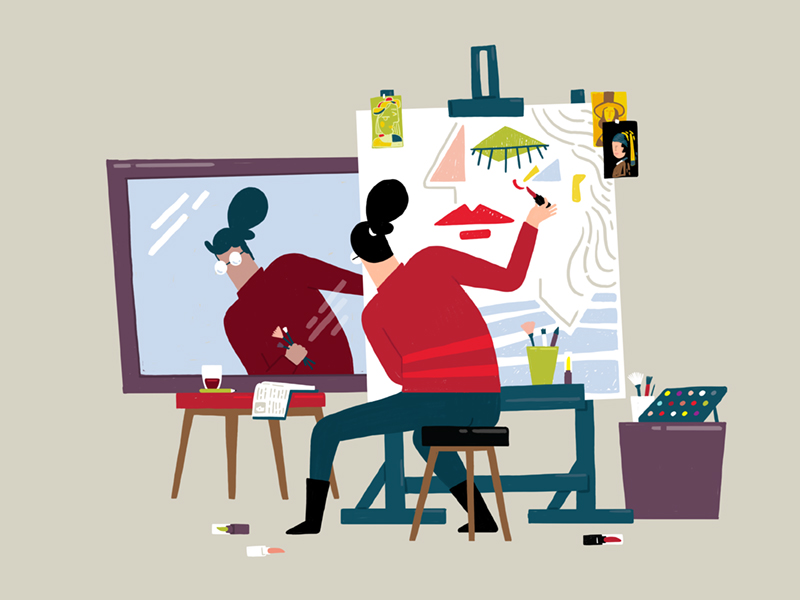Cosmetics traditionally have been sold to women as a way to conceal flaws, but new research shows that marketing beauty brands as a creative medium for self-expression gets greater acceptance on social media, where word-of-mouth from beauty influencers reigns.

Consumers who use cosmetic products, like makeup and hair dye, can be viewed as applying a disguise and, as a result, less authentic. However, a marketing study from the University of Georgia found that beauty work motivated by self-expression rather than self-enhancement was judged more favorably by others.
“People tend to assume that others use makeup to hide aspects of their appearance, which they then link with concealment of the true self,” said Rosanna Smith, a marketing professor at the Terry College of Business and the study’s lead author. “But a self-expression framing prompts people to think about makeup differently. Just like Picasso painted on a canvas, people who use makeup paint their faces. When makeup is seen as an art form as opposed to a concealment strategy, people perceive it as more authentic.”
The paper, “Makeup Who You Are: Self-Expression Enhances the Perceived Authenticity and Public Promotion of Beauty Work,” was published in January by the Journal of Consumer Research. Smith’s co-authors were UGA psychology professor Michelle vanDellen and marketing Ph.D. student Lan Anh Ton.
Smith studies the concept of authenticity and how it is used in marketing and consumer branding. She said the growing desire for authenticity among consumers is in part driven by overexposure to marketing content and increasing distrust in social institutions. Consumers place a higher premium on “realness” and authenticity in the brands they choose, the advice they follow and the way they judge others.

Consumers are now more likely to rely on beauty influencers’ recommendations for new cosmetic products than on traditional advertising. But the stigma of being judged can prevent people, and even beauty influencers, from sharing everything about their beauty or makeup routines, Smith said.
“Authenticity can be challenging to achieve in the beauty industry,” Smith said. “There is a tension for consumers between the desire to alter one’s appearance and the fear of misrepresenting the self. As a result, consumers may avoid telling others about their beauty work for fear of negative social judgments.”
Smith connected efforts to reframe makeup as a “creation tool” with classical notions of essentialism and existentialism. Essentialism roots the true self in what is natural or innate about a person, with cosmetics obscuring that notion via “concealing your true self.” While existentialism argues that people create the true self through their choices and actions, with beauty work being one potential creative outlet for self-expression.
Smith initially tested this reasoning after the CoverGirl cosmetics brand temporarily changed its marketing slogans from the 20-year-old “Easy, Breezy, Beautiful” to the more self-expressive “I Am What I Make Up” in 2017. She analyzed more than 3,000 Instagram posts that included the hashtag #easybreezybeautiful or #IamwhatImakeup.
She found that Instagram users who used the self-expression hashtag engaged in more word-of-mouth about beauty products and wore more noticeable makeup compared to those who used the original hashtag.
“This suggests that people are less likely to hide their beauty work from others when they have a self-expression framing,” Smith said.
Additional experiments further established the link between self-expression and authenticity. In one experiment, more than 300 people were asked to rate two Instagram posts with identical information except for some of the beauty influencer’s language.

Participants overwhelmingly rated the influencer using her makeup to express herself as more authentic than the same influencer who was using makeup to enhance her look. Study subjects who viewed the self-expression post also reported higher intentions to purchase the makeup and share information about the brand.
“You can hold constant the actual change in appearance via makeup, and people will judge it differently simply if you alter the motivation for the change. Was it to look better or to express yourself?” she said.
The study has strong implications for how marketers should present makeup brands to consumers. Framing a product as a tool for self-expression not only reduces the stigma against beauty work and leads customers to view the brand more positively, it can also generate more word-of-mouth for the brand, attracting new customers.


